Film in Focus No. 13:
A Look at LAURA -
David Raksin's evocative film score
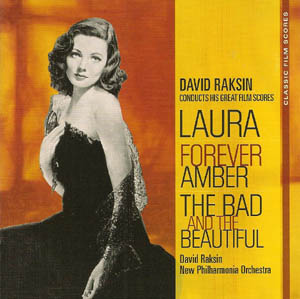
In this FILM IN FOCUS article, Film music critic Roger Hall offers his personal view about this classic film score.
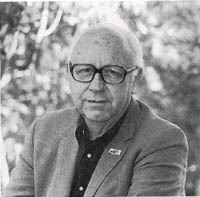
"David Raksin arrived on the scene in Hollywood at a time when film music had begun to master the obvious. He was one of the major figures in helping to free film scoring from the hold of 19th-century romanticism. His use of the orchestra and its instrumentation was unique and advanced for the time."
-- Elmer Bernstein

The Score
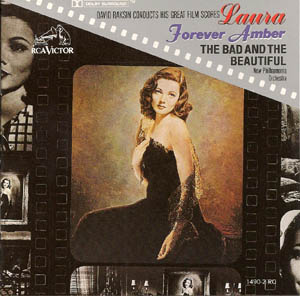
Modern Times
Unlike the European emigres who came to work during Hollywood's Golden Age, such as Korngold, Rozsa, Steiner, Tiomkin and Waxman, Raksin was of American vintage. He was born in Philadelphia on April 4, 1912. He credits his first break to George Gershwin. As Raksin tells it, his arrangement of 'I Got Rhythm' pleased Gershwin, so Gershwin recommended him to his publisher. Soon Raksin was writing for Broadway shows.
Raksin came to Hollywood in 1934 at the age of 22. His first assignment was to arrange the melodies of Charlie Chaplin for his film MODERN TIMES.
After completion of the Chaplin score, Raksin returned to new York and worked on several Broadway shows. Then, in 1937, he was offered more money to join the composing staff at Universal Pictures. One year after working at Universal, he joined the staff at 20th Century Fox.
Laura to Amber
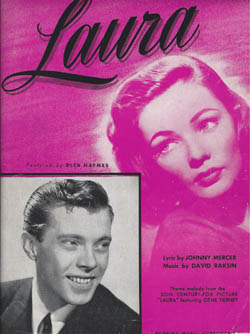
"At that time," Raksin explained, "I was considered much too far out and insufficiently housebroken to be turned loose on anything less resilient than a nice grue and horror film. But I was the next detective-mystery-story type in line, so Newman signed me to write the score for LAURA (1944).
As any film fan knows, his score for LAURA (1944) literally put his name on the film music map. Ironically, that scoring assignment had been offered first to Bernard Herrmann, who Raksin called "a virtuoso of unspecific anger," who turned it down because "if it wasn't good enough for Newman it could hardly be good enough for him [Herrmann]"...A few years after LAURA, Raksin composed one of his most elaborate and impressive scores for FOREVER AMBER...In his interview with Elmer Bernstein, Raksin tells how the opening theme was put together:
"It starts with an idea I called a quasicaglia -- a pun on the word passacaglia -- which in this case was just a G minor scale; two parts superimpose themselves over that and develop into a sicilliene, which eventually turns into an extended melody."

The story of how he wrote the LAURA theme has been told before (for example, in A GUIDE TO FILM MUSIC) and in the record notes of the 1976 RCA LP album. This album with suites from LAURA, FOREVER AMBER and THE BAD AND THE BEAUTIFUL was later released on RCA Victor CD in Dolby Surround Sound in 1989. These are his three best known scores and are conducted by Raksin leading the New Philharmonia Orchestra. This same album was reissued with a new CD cover and excellent re-mastered sound in the Classic Film Scores series by RCA/Sony Music Entertainment in 2011.
Speaking Out
On April 21, 2001, David Raksin was a guest at the Composing for Film series presented at the American Museum of the Moving Image in Astoria, New York.
When asked about THE BAD AND THE BEAUTIFUL, he said that Betty Comden and Adolphe Green liked his score, but Vincente Minnelli (the director) and John Houseman (the producer) didn't. Minnelli asked him to write 'a siren song,' and that's what he wrote. Raksin said he was especially pleased that Broadway composer Stephen Sondheim told him it was the best film score he'd ever heard.
Raksin said he was pleased with his score for the underrated film, SUDDENLY (1954), which was scored for strings and four horns and only had about 16 minutes of music -- but minutes that 'really counted.' He also mentioned scenes for some 20th Century Fox musicals, such as the big splashy finale to Busby Berkeley's THE GANG'S ALL HERE (1945).
Another of his favorable scores was THE MAN WITH A CLOAK (1951), with its theme based on a twelve-tone row [included on David Raksin at M-G-M].
When asked about other film composers, Raksin named Bernard Herrmann as one he especially admired. He said, 'Benny had a gift for writing sequences rather than melody.' Using VERTIGO as an example, Raksin called it 'Our Lady of Perpetual Sequences.'
Conversation with Raksin
Even though the following remarks were years ago, they still apply to today's music scene. Raksin was very candid when he said to Elmer Bernstein in an 1976 conversation:
"I am convinced that we have lost something of the essence, the breadth and scope, and heart of film music...We were assured that anything goes as long as one wants to do it. All very well if what you want to do is to finger paint or make mud pies. But when it comes to flying a 747 or performing open-heart surgery - or doing almost anything worth doing that requires more than rudimentary skills, such as composing film scores - there is no substitute for education and self-discipline. Talent alone will not suffice if dues have not been paid, and if intelligence and intuition are not brought to bear"
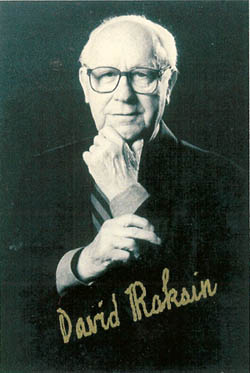
David Raksin: A Centennial Tribute
CD Review
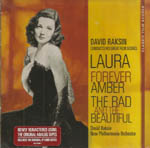
Best of the Month - April 2011
Three Scores by David Raksin
(review by Steven A. Kennedy)
